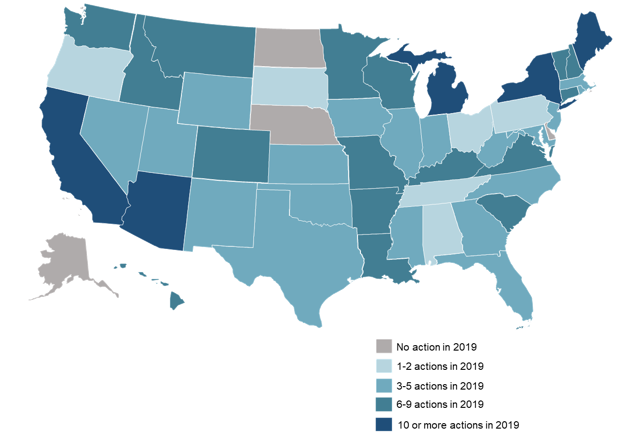The 50 States of Solar Report: 46 States and DC Took 265 Distributed Solar Policy and Rate Design Actions During 2019
Raleigh, N.C. – (January 29, 2020) The N.C. Clean Energy Technology Center (NCCETC) released its 2019 annual review and Q4 update edition of The 50 States of Solar. The quarterly series provides insights on state regulatory and legislative discussions and actions on distributed solar policy, with a focus on net metering, distributed solar valuation, community solar, residential fixed charges, residential demand and solar charges, third-party ownership, and utility-led rooftop solar programs.
The report finds that 46 states and the District of Columbia took some type of distributed solar policy action during 2019 (see figure below), with the greatest number of actions relating to net metering policies, residential fixed charge increases, and community solar policies.
2019 Policy Action on Net Metering, Rate Design, and Solar Ownership

The report highlights ten of the top distributed solar policy trends of 2019:
- Policy decisions encouraging distributed solar development;
- Regulators focusing on the netting period for net metering successor tariffs;
- Utilities proposing fewer and smaller residential fixed charge increases;
- Attention shifting from demand charges to system capacity-based charges;
- Policymakers increasing net metering system size limits;
- State rules encouraging low-income participation in community solar programs:
- Conducting extensive value of solar studies to inform net metering successors;
- States refining existing community solar program rules;
- Establishing separate net metering rules for different project or customer types; and
- States considering net metering for solar-plus-storage facilities.
“This was another action-packed year for distributed solar policy, with several states taking significant actions to set the stage for continued growth,” observed Brian Lips, Senior Policy Project Manager at NCCETC.
A total of 265 state and utility level distributed solar policy and rate changes were proposed, pending, or decided in 2019. Net metering actions increased by 30% over 2018, while residential fixed charge increases decreased by 25%. The report notes that ten of the most active states in 2019 for solar policy developments were:
- Arkansas where state lawmakers authorized solar leasing and established requirements for a net metering successor tariff;
- South Carolina, where legislators enacted a compromise bill initiating a net metering cost-benefit study and the development of a successor tariff;
- Connecticut, where lawmakers enacted legislation requiring a value of distributed energy resources study and regulators approved shared solar program rules;
- Idaho, where the Public Service Commission issued a decision continuing net metering for Idaho Power and requiring a comprehensive net metering cost-benefit study;
- Maine, where legislators restored net metering, approved a new compensation program for large customers, and mandated the procurement of 250 MW of shared distributed generation;
- New York, where regulators adopted changes to the value stack compensation and extended mass market net metering;
- Michigan, where utility regulators new solar compensation tariffs for DTE Electric and UPPCO, while rejecting proposed system access charges;
- Vermont, where the Public Utility Commission opened a net metering rulemaking and approved a new upfront fee for distributed generation systems on certain circuits;
- Louisiana, where the Public Service Commission approved a net metering successor tariff and authorized community net metering; and
- New Hampshire, where regulators approved the scope for a value of distributed energy resources study and lawmakers considered net metering legislation.
“This past year was characterized by decisions favorable to the growth of distributed solar,” said Autumn Proudlove, lead author of the report and Senior Manager of Policy Research at NCCETC. “Policymakers in several states elected to continue net metering or take steps toward compromise successor tariffs, while expanding community solar programs and third-party ownership options.”
In Q4 2019, 43 states and D.C. took some type of action on distributed solar policy or rate design. A total of 144 actions were tracked in Q4.
View the 50 States of Solar Annual Report and Q4 2019 Executive Summary
View and Purchase the 50 States of Solar Annual Report and Q3 2019 update FULL Report
View other 50 States Reports – Solar, Grid Modernization and Electric Vehicles
ABOUT THE N.C. CLEAN ENERGY TECHNOLOGY CENTER
The N.C. Clean Energy Technology Center, as part of the College of Engineering at North Carolina State University, advances a sustainable energy economy by educating, demonstrating and providing support for clean energy technologies, practices and policies. It serves as a resource for innovative, sustainable energy technologies through technology demonstration, technical assistance, outreach and training. For more information about the Center, visit: http://www.nccleantech.ncsu.edu. Twitter: @NCCleanTech
MEDIA CONTACT: Shannon Helm, NCCETC, shannon_helm@ncsu.edu